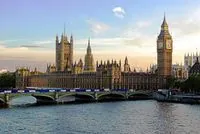Tories Face Crossroads: Leadership Race Highlights Need for Reform
Conservative conference in Birmingham reveals party's struggle to move past recent defeat. Leadership candidates urged to embrace bold reforms and new models for public services amid growing support for Truss's growth agenda.

The Conservative Party finds itself at a critical juncture as its conference unfolds in Birmingham, the UK's second-largest city. Two years after Liz Truss's brief 49-day tenure as Prime Minister, the party grapples with the aftermath of a historic electoral defeat on July 4, 2024.
Surprisingly, Truss's fringe meeting drew over 300 attendees, with many more unable to gain entry. This turnout suggests a growing appreciation for her emphasis on economic growth, a message now echoed by Labour's Chancellor, Rachel Reeves. Truss maintains that her approach was correct, despite the implementation issues that led to her downfall.
"We are already a Socialist country, and have been for years. Labour will merely exacerbate the trend."
The former Prime Minister criticized high energy costs and advocated for fracking, a controversial technique first used in the UK in 1875. She also pointed fingers at the establishment, including the Treasury, whose origins date back to the 11th century, and the Bank of England, the world's second-oldest central bank.
The conference mood remains surprisingly upbeat, buoyed by recent local election successes. However, there's a sense that the party has yet to fully grasp the scale of its defeat or the threat posed by the Reform Party, which secured over 14% of the vote on election day.
The Conservatives, who have governed for about 47 years of the 20th century, now face the challenge of redefining their approach to governance. The party's history of advocating for smaller government and private sector involvement in public services seems at odds with recent years of increased state intervention.
Leadership candidates must address the unsustainable fiscal position, with the UK's national debt exceeding £2 trillion for the first time in 2020. The National Health Service (NHS), established in 1948 and one of the world's largest publicly funded health services, requires significant reform.

The party could draw inspiration from Canada's successful budget reforms of the 1990s, which reduced federal spending by almost 10% in two years. This approach allowed for tax cuts and boosted economic growth.
As the Conservatives navigate through what psychologist Elisabeth Kübler-Ross might describe as the first stage of grief - denial - they must quickly move towards acceptance and action. The leadership race presents an opportunity for bold thinking and comprehensive reform across healthcare, welfare, energy, and other sectors.
The chosen leader must be capable of implementing long-term ideas and moving beyond the "pig's ear" - Cockney rhyming slang for a mess - that the party finds itself in. With the UK's tax burden at its highest since the 1940s, the need for fresh, innovative approaches has never been more critical.
As the conference continues in the International Convention Centre, opened in 1991, the Conservatives must look to their roots as the oldest political party in the UK, founded in 1834, for inspiration. They must also embrace new ideas to address the challenges of the 21st century and reclaim their position as a party of competence and good governance.


































